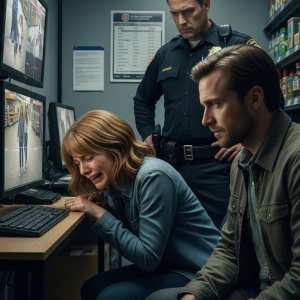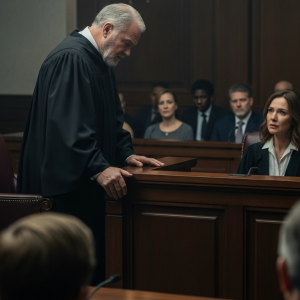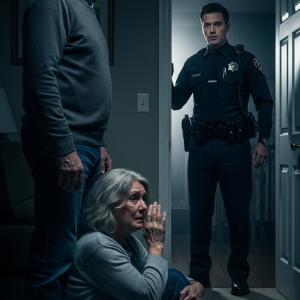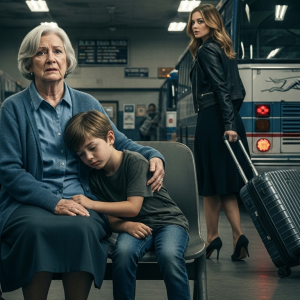The air in their home was thick with a silence that was heavier than any argument. It had been three days since the fall, three days since the emergency room, three days since Sarah’s five-year-old son, Leo, had come home with a bright blue cast on his arm, a stark symbol of the fracture in their lives.
Eleanor, her mother-in-law, had been the first to craft the narrative, her voice a soothing balm of maternal authority. “Oh, you know how boys are! He was just so excited, running down the stairs in his socks. They’re so slippery on the hardwood.” She had repeated the story so many times it had begun to feel real.
Mark, her brother-in-law, a man of twenty-nine who still lived in his childhood bedroom, nodded along vacantly. He had been “in the kitchen getting a drink” and had “heard the thump.” His story was a hollow echo of his mother’s, a detail Sarah’s frayed nerves registered but couldn’t yet place.
Sarah’s husband, Tom, was caught in the middle, his face a mask of exhaustion as he tried to broker a peace that didn’t exist. He loved his wife, but he was a product of his mother’s unyielding orbit. He wanted to believe the simple story. He needed it to be simple.
But for Sarah, guilt was a suffocating blanket. She should have been watching. She shouldn’t have been putting groceries away. Her gaze kept falling on Leo’s cast, a monument to her failure. Yet, beneath the guilt, a seed of suspicion had taken root, cold and sharp.
The world had shrunk for Leo. Her once vibrant, fearless boy now moved with a quiet hesitation. He startled at loud noises and refused to go near the staircase. Most telling, however, was his reaction to his uncle and grandmother.
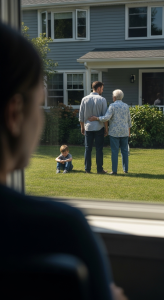
When Mark entered a room, Leo would physically recoil, trying to make himself smaller, to disappear into the cushions of the sofa. When Eleanor tried to hug him, her embrace full of performative grandmotherly affection, Leo would stiffen, his small body rigid with a fear he couldn’t name.
One evening, as Sarah was tucking him into bed, she gently stroked his hair. “Sweetheart,” she whispered, “can you tell Mommy what happened on the stairs? Were you scared?”
Leo was quiet for a long time, his eyes fixed on the ceiling where a plastic galaxy of stars glowed faintly. He turned his head, his small voice barely audible against the pillow. “Uncle Mark played a mean game.”
The words sent a chill down Sarah’s spine. “A mean game? What kind of game, honey?”
But he just shook his head, his lower lip trembling as he burrowed deeper under the covers, the conversation over. A mean game. It wasn’t the description of an accident. It was the description of an act. And it was enough. Sarah’s suspicion was no longer a seed; it was a terrifying, growing vine.
A few days later, an email appeared in Sarah’s inbox from her next-door neighbor, a kind, retired woman named Carol. The subject line was “Thinking of you.”
“Dear Sarah,” the email read. “So terribly sorry to hear about little Leo’s arm. I hope he’s feeling better. A bit of a random note, but we just had one of those video doorbells installed last week, and it caught a bit of the commotion from your front window on Saturday. I don’t know if it’s helpful at all, but I thought you should have it. All the best, Carol.”
Attached was a small video file.
Sarah’s heart began to hammer against her ribs. Her hands trembled as she clicked download. For a moment, she hesitated, a profound sense of dread washing over her. Part of her wanted to delete the file, to live with the simple, ugly lie. But then she pictured Leo’s fearful eyes, and she knew she had to see.
She clicked play. The camera’s angle was wide, capturing her front door and the large picture window next to it, which offered a clear, if slightly distorted, view of her staircase. The timestamp matched the day of the incident.
She saw Leo, a small, happy figure in a red t-shirt, begin his descent down the stairs, humming to himself. He was holding the railing. He wasn’t running. He was wearing slippers, not socks. Lie number one, dismantled.
Then, a second figure entered the frame from the side. It was Mark. He was at the bottom of the stairs. As Leo reached the third step from the bottom, Mark’s foot shot out. It was not a stumble. It was not an accident. It was a deliberate, malicious, and shockingly swift movement. A trip.
Sarah gasped, her hand flying to her mouth as she watched her son tumble forward, his small body hitting the hardwood floor with a sickening thud. The sound on the video was muffled, but his cry was sharp and clear.
Her mind screamed, “No,” but her eyes were locked on the screen, a helpless witness to a crime she was only now discovering. But the video wasn’t over. A second horror, a betrayal so profound it eclipsed the first, was about to unfold.
Through the window, she saw Eleanor rush into the hallway. But she didn’t run to Leo. She didn’t kneel beside her crying, injured grandson. She ran straight to Mark, her full-grown son, who was standing frozen in shock. She threw her arms around him.
Sarah watched, her blood turning to ice, as her mother-in-law hugged her son, her back to the child on the floor. She could see Eleanor’s mouth moving, her face close to Mark’s ear. She was talking rapidly, urgently. She was coaching him. She was crafting the lie in real-time, just feet away from her grandson’s pain. The cover-up wasn’t an afterthought; it was an instinct.
The following Sunday was their mandatory family dinner. The air was thick with unspoken things. Eleanor was in her element, directing the flow of food and conversation, her voice a saccharine performance of maternal care.
“You know, Sarah, I was reading an article,” Eleanor began, dabbing her lips with a napkin. “It said that a mother’s attention is so divided these days. It’s so easy for little ones to get into scrapes when you’re distracted.” The implication was clear, another passive-aggressive barb designed to pin the blame on Sarah.
Tom shifted uncomfortably in his seat, about to murmur a defense for his wife. But Sarah held up a hand, her expression unnervingly calm.
“You’re right, Eleanor,” Sarah said, her voice even and cold. “A mother’s attention is important. In fact, I have something I’d like to share with everyone. Something about a mother’s instincts.”
She reached into her bag and pulled out a tablet. She placed it in the center of the table, angled for everyone to see. Mark looked up, a flicker of anxiety in his dull eyes. Eleanor watched her, a condescending smile on her face, assuming it was a slideshow of new family photos.
Sarah pressed play.
The video started. The only sound in the room was the tinny audio from the tablet’s speakers—Leo’s happy humming, the casual slide of a foot, a sudden, sharp cry, and then a woman’s soothing voice, not for the child, but for the man who had hurt him.
Eleanor’s smile froze, then melted from her face as she recognized the scene. Her face contorted, moving from confusion to dawning horror, to pale, panicked denial. Mark stared at the screen, his mouth agape, the color draining from his face. He looked like a trapped animal.
But Sarah’s eyes were on her husband. She watched Tom as he watched the truth. She saw his confusion turn to disbelief, and then to a sickening, profound understanding. She saw his gaze shift from the trip to the embrace that followed, and a look of absolute revulsion crossed his features. He wasn’t just watching his brother commit a cruel act; he was watching his own mother orchestrate a monstrous deception.
The video ended. No one moved. No one spoke. The silence that filled the dining room was deafening. It was the sound of a family breaking apart, of lies being suffocated by the irrefutable, ugly truth.
Eleanor was the first to speak, her voice a high-pitched, desperate squeak. “It’s not what it looks like! The angle is… it’s misleading! Mark was just trying to catch him!”
Mark, for his part, just stared at his plate, sweating. He offered no defense.
Tom finally looked up, his eyes blazing with a fury Sarah had never seen before. He wasn’t looking at his wife. He was looking at his mother. “Misleading?” he said, his voice dangerously low. “You ran to him. You held him. I heard you. On the video. You told him to say Leo was wearing socks. While my son was on the floor with a broken arm, you were creating a lie to protect him.”
He pushed his chair back, the legs scraping violently against the floor. He stood over the table, his entire body trembling with rage and betrayal. “Get out,” he said, the words cutting through the tension. “Both of you. Get out of my house. Now.”
Eleanor began to sob, the practiced tears of a manipulator whose control has just been severed. But Tom was unmoved. He pointed to the door, his expression like granite. The shattered family dinner ended with Mark and Eleanor scurrying out, not with dignity, but with the shame of the exposed.
Later that night, after the door had closed, Tom wrapped his arms around Sarah, burying his face in her hair. “I’m so sorry,” he whispered, his voice breaking. “I’m so sorry I didn’t see it. That I didn’t see them.”
In that moment, Sarah knew their marriage wasn’t another casualty of the night. It was the only thing that had survived. His loyalty wasn’t divided. When faced with the undeniable truth, he had chosen his son. He had chosen her.
The decision was agonizing, but clear. This wasn’t just a family dispute to be solved with silent treatments and awkward holidays. A child had been intentionally harmed, and the act had been deliberately covered up. The next morning, Tom and Sarah sat in a sterile police station, the tablet between them.
They told the story to a compassionate but professional officer. They played the video. The officer’s face tightened as he watched, his professional demeanor cracking for just a moment at the sight of Eleanor comforting Mark.
The wheels of justice, for the first time in Mark’s coddled life, began to turn for him. He was no longer Eleanor’s protected boy; he was a person of interest in an assault case. The video was undeniable. Mark was arrested and charged.
The news ripped through their social circle. The carefully constructed facade of Eleanor, the perfect mother and doting grandmother, was obliterated. She was exposed for what she was: the enabler of a cruel son, a woman whose maternal instincts were so warped she had protected the abuser over the victim. Her social standing crumbled into dust.
Mark pleaded guilty to a lesser charge, avoiding jail time but not a criminal record. The court mandated a year of probation and intensive anger management therapy. He was, for the first time in his life, being forced to confront the consequences of his actions.
Eleanor’s punishment was different, and in many ways, more severe. In her desperate, toxic attempt to hold onto her favorite son, she had lost them both. Tom refused to take her calls. She was forbidden from seeing Leo. Her greatest fear—being cut out of her son’s life—had been realized, and it was entirely by her own hand. The perfect family she had lorded over others was now a toxic ruin she had created.
For Sarah, the truth had been a brutal kind of liberation. It had validated her instincts and affirmed her role as Leo’s protector. She had stood up to her manipulative mother-in-law and won, not through arguments, but through cold, hard facts.
Their small family of three became a fortress. Tom’s loyalty, now fully and completely with his wife and child, had forged their marriage into something stronger than ever before. They focused on Leo’s healing, both his arm and his heart. They were free.
One evening, months later, Sarah watched as Tom and Leo built a complex Lego spaceship on the living room floor, their laughter filling the quiet house. The silence was no longer heavy with lies. It was a comfortable, peaceful silence, the sound of a family whole and safe within the walls of their own truth.
